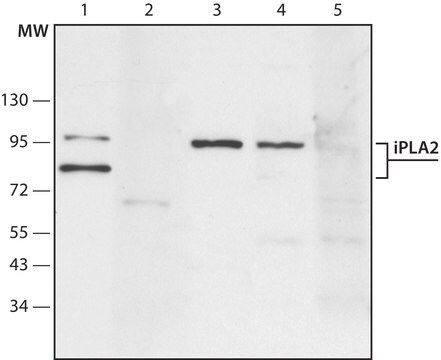MAB1668
Anti-Phospholipase A2 Antibody, clone CH-7
clone CH-7, Chemicon®, from mouse
Synonym(s):
PLA2
Sign Into View Organizational & Contract Pricing
All Photos(1)
About This Item
UNSPSC Code:
12352203
eCl@ss:
32160702
NACRES:
NA.41
Recommended Products
biological source
mouse
Quality Level
antibody form
purified antibody
antibody product type
primary antibodies
clone
CH-7, monoclonal
manufacturer/tradename
Chemicon®
technique(s)
ELISA: suitable
western blot: suitable
isotype
IgG2b
NCBI accession no.
UniProt accession no.
shipped in
wet ice
target post-translational modification
unmodified
Specificity
Antibody reacts with cytosolic form of PLA2. Antibody will also react with beta isoform. Epitope has been localized within the first 216 aa of the N-terminal Ca++ binding domain of cPLA2
Immunogen
Recombinant cPLA2 expressed from the human cPLA2 gene.
Application
Detect Phospholipase A2 using this Anti-Phospholipase A2 Antibody, clone CH-7 validated for use in ELISA & WB.
Immunoblot: 1:500-1:1000; antibody recognizes all isoforms, the cPLA.
Alpha (85kDa) typically migrates as 100-110kDa on reducing westerns; beta migrates as 114kDa; antibody will also recognize the sPLA at approximately 14-20kDa.
ELISA
Optimal working dilutions must be determined by the end user.
Alpha (85kDa) typically migrates as 100-110kDa on reducing westerns; beta migrates as 114kDa; antibody will also recognize the sPLA at approximately 14-20kDa.
ELISA
Optimal working dilutions must be determined by the end user.
Research Category
Signaling
Signaling
Research Sub Category
Lipid Signaling
Lipid Signaling
Physical form
Format: Purified
In 20 mM sodium phosphate, 250 mM sodium chloride, 0.1% sodium azide, pH. 7.6
Storage and Stability
Maintain at 2-8°C.
Other Notes
Concentration: Please refer to the Certificate of Analysis for the lot-specific concentration.
Legal Information
CHEMICON is a registered trademark of Merck KGaA, Darmstadt, Germany
Disclaimer
Unless otherwise stated in our catalog or other company documentation accompanying the product(s), our products are intended for research use only and are not to be used for any other purpose, which includes but is not limited to, unauthorized commercial uses, in vitro diagnostic uses, ex vivo or in vivo therapeutic uses or any type of consumption or application to humans or animals.
Not finding the right product?
Try our Product Selector Tool.
Storage Class
10 - Combustible liquids
wgk_germany
WGK 2
flash_point_f
Not applicable
flash_point_c
Not applicable
Certificates of Analysis (COA)
Search for Certificates of Analysis (COA) by entering the products Lot/Batch Number. Lot and Batch Numbers can be found on a product’s label following the words ‘Lot’ or ‘Batch’.
Already Own This Product?
Find documentation for the products that you have recently purchased in the Document Library.
Tian Sheng Chen et al.
Nucleic acids research, 38(1), 215-224 (2009-10-24)
Intercellular exchange of protein and RNA-containing microparticles is an increasingly important mode of cell-cell communication. Here we investigate if mesenchymal stem cells (MSCs) known for secreting therapeutic paracrine factors also secrete RNA-containing microparticles. We observed that human embryonic stem cell
Clive Bate et al.
The Journal of biological chemistry, 291(1), 160-170 (2015-11-11)
The prion diseases occur following the conversion of the cellular prion protein (PrP(C)) into disease-related isoforms (PrP(Sc)). In this study, the role of the glycosylphosphatidylinositol (GPI) anchor attached to PrP(C) in prion formation was examined using a cell painting technique.
Clive Bate et al.
BMC biology, 6, 39-39 (2008-09-16)
The transmissible spongiform encephalopathies, otherwise known as prion diseases, occur following the conversion of the cellular prion protein (PrPC) to an alternatively folded, disease-associated isoform (PrPSc). Recent studies suggest that this conversion occurs via a cholesterol-sensitive process, as cholesterol synthesis
Clive Bate et al.
The Journal of biological chemistry, 286(11), 8752-8758 (2011-01-08)
Prion diseases occur following the conversion of the cellular prion protein (PrP(C)) into a disease related, protease-resistant isoform (PrP(Sc)). In these studies, a cell painting technique was used to introduce PrP(C) to prion-infected neuronal cell lines (ScGT1, ScN2a, or SMB
Our team of scientists has experience in all areas of research including Life Science, Material Science, Chemical Synthesis, Chromatography, Analytical and many others.
Contact Technical Service








